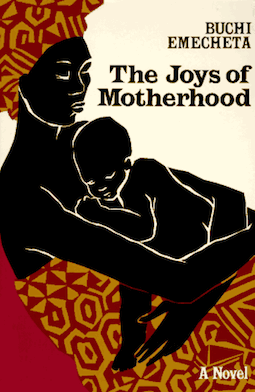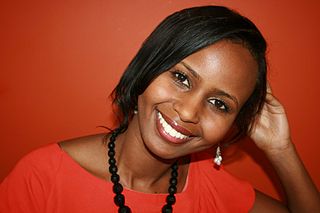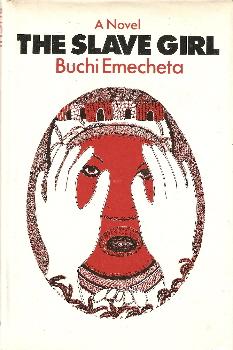
Zadie Smith FRSL is an English novelist, essayist, and short-story writer. Her debut novel, White Teeth (2000), immediately became a best-seller and won a number of awards. She became a tenured professor in the Creative Writing faculty of New York University in September 2010.

Florence Onyebuchi "Buchi" Emecheta was a Nigerian-born novelist, based in the UK from 1962, who also wrote plays and an autobiography, as well as works for children. She was the author of more than 20 books, including Second Class Citizen (1974), The Bride Price (1976), The Slave Girl (1977) and The Joys of Motherhood (1979). Most of her early novels were published by Allison and Busby, where her editor was Margaret Busby.

The Bride Price is a 1976 novel by Nigerian writer Buchi Emecheta. It concerns, in part, the problems of women in post-colonial Nigeria. The author dedicated this novel to her mother, Alice Ogbanje Emecheta.

Florence Nwanzuruahu Nkiru Nwapa, was a Nigerian author who has been called the mother of modern African Literature. She was the forerunner to a generation of African women writers, and the first African woman novelist to be published in the English language in Britain. She achieved international recognition with her first novel Efuru, published in 1966 by Heinemann Educational Books. While never considering herself a feminist, she was best known for recreating life and traditions from an Igbo woman's viewpoint.
Sarah Ladipo Manyika FRSL is a British-Nigerian writer of novels, short stories and essays and an active member of the literary community, particularly supporting and amplifying young writers and female voices. She is the author of two well-received novels, In Dependence (2009) and Like A Mule Bringing Ice Cream To The Sun (2016), as well as the non-fiction collection Between Starshine and Clay: Conversations from the African Diaspora (2022), and her writing has appeared in publications including Granta, Transition, Guernica, and OZY, and previously served as founding Books Editor of OZY. Manyika's work also features in the 2019 anthology New Daughters of Africa, edited by Margaret Busby.

The Joys of Motherhood is a novel written by Buchi Emecheta. It was first published in London, UK, by Allison & Busby in 1979 and was first published in Heinemann's African Writers Series in 1980 and reprinted in 1982, 2004, 2008. The basis of the novel is the "necessity for a woman to be fertile, and above all to give birth to sons". It tells the tragic story of Nnu-Ego, daughter of Nwokocha Agbadi and Ona, who had a bad fate with childbearing. This novel explores the life of a Nigerian woman, Nnu Ego. Nnu's life centres on her children and through them, she gains the respect of her community. Traditional tribal values and customs begin to shift with increasing colonial presence and influence, pushing Ego to challenge accepted notions of "mother", "wife", and "woman". Through Nnu Ego's journey, Emecheta forces her readers to consider the dilemmas associated with adopting new ideas and practices against the inclination to cleave to tradition. In this novel, Emecheta reveals and celebrates the pleasures derived from fulfilling responsibilities related to family matters in child-bearing, mothering, and nurturing activities among women. However, the author additionally highlights how the "joys of motherhood" also include anxiety, obligation, and pain.

Nadifa Mohamed is a Somali-British novelist. She featured on Granta magazine's list "Best of Young British Novelists" in 2013, and in 2014 on the Africa39 list of writers aged under 40 with potential and talent to define future trends in African literature. Her 2021 novel, The Fortune Men, was shortlisted for the 2021 Booker Prize, making her the first British Somali novelist to get this honour. She has also written short stories, essays, memoirs and articles in outlets including The Guardian, and contributed poetry to the anthology New Daughters of Africa. Mohamed was also a lecturer in Creative Writing in the Department of English at Royal Holloway, University of London until 2021. She will be Distinguished Writer in Residence at New York University in Spring 2022.

Taiye Selasi is an American writer and photographer. Of Nigerian and Ghanaian origin, she describes herself as a "local" of Accra, Berlin, New York and Rome. In 2005, Selasi published "Bye-Bye, Babar ", her seminal text on Afropolitans. Her novel, Ghana Must Go, was published by Penguin in 2013.
Allison & Busby is a publishing house based in London established by Clive Allison and Margaret Busby in 1967. The company has built up a reputation as a leading independent publisher.

Gwendolen a 1989 novel by Nigerian-born writer Buchi Emecheta, also known by its United States title The Family. It is her tenth novel.
Noo Saro-Wiwa is a British-Nigerian author, noted for her travel writing. She is the daughter of Nigerian activist Ken Saro-Wiwa.
Ferdinand Dennis is a writer, broadcaster, journalist and lecturer, who is Jamaican by birth but at the age of eight moved to England, where his parents had migrated in the late 1950s. Dr James Procter notes: "Perhaps as a result of his Caribbean background, Dennis is a writer ultimately more concerned with routes than roots. This is foregrounded in much of his fictional work, notably his most recent and ambitious novel to date, Duppy Conqueror (1998), a novel which moves from 1930s Jamaica to postwar London and Liverpool, to Africa. Similarly, Dennis' non-fiction centres on journeying rather than arrival, from Behind the Frontlines: Journey into Afro-Britain (1988) to Voices of the Crossing: The Impact of Britain on Writers from Asia, the Caribbean and Africa (2000)."

Margaret Yvonne Busby,, Hon. FRSL, also known as Nana Akua Ackon, is a Ghanaian-born publisher, editor, writer and broadcaster, resident in the UK. She was Britain's youngest and first black female book publisher when she and Clive Allison (1944–2011) co-founded the London-based publishing house Allison and Busby in the 1960s. She edited the anthology Daughters of Africa (1992), and its 2019 follow-up New Daughters of Africa. She is a recipient of the Benson Medal from the Royal Society of Literature. In 2020 she was voted one of the "100 Great Black Britons". In 2021, she was honoured with the London Book Fair Lifetime Achievement Award. In 2023, Busby was named as president of English PEN.
Simi Bedford is a Nigerian novelist based in Britain. Her 1991 debut book Yoruba Girl Dancing, an autobiographical novel about a young Nigerian girl who is sent to England to receive a private school education, was well reviewed on publication and was the subject of a BBC Radio 4 abridgement. Her second novel, Not With Silver, was published in 2007.

Delia Jarrett-Macauley, also known as Dee Jarrett-Macauley, is a London-based British writer, academic and broadcaster of Sierra Leonean heritage. Her debut novel, Moses, Citizen & Me, won the 2006 Orwell Prize for political writing, the first novel to have been awarded the prize. She has devised and presented features on BBC Radio, as well as being a participant in a range of programmes. As a multi-disciplinary scholar in history, literature and cultural politics, she has taught at Leeds University, Birkbeck, University of London, and other educational establishments, most recently as a fellow in English at the University of Warwick. She is also a business and arts consultant, specialising in organisation development.

The Slave Girl is a 1977 novel by Nigerian writer Buchi Emecheta that was published in the UK by Allison and Busby and in the US by George Braziller. It won the Jock Campbell Award from the New Statesman in 1978. The novel was Emecheta's fourth book; it was dedicated to her editor Margaret Busby.

Head above Water is a 1986 non-fiction book by Nigerian novelist Buchi Emecheta. It was published in 1986 in the African Writers Series by Heinemann and has been described as "anecdotal autobiography."
In the Ditch is a 1972 novel written by Nigerian writer Buchi Emecheta. It was first published on New Statesman as a regular column then published in 1972 by Allison & Busby in London, where her editor was Margaret Busby.
The New Tribe is a 2000 novel written by Nigerian writer Buchi Emecheta. It was first published by Allison & Busby, and republished by Heinemann as part of the African Writers Series.

Destination Biafra is a 1982 novel by Nigerian writer Buchi Emecheta, first published in London by Allison & Busby. It is considered to be Emecheta's personal account of the Biafra War. Destination Biafra was republished in paperback on 1 March 1994 by Heinemann Educational Books as part of the African Writers Series.













